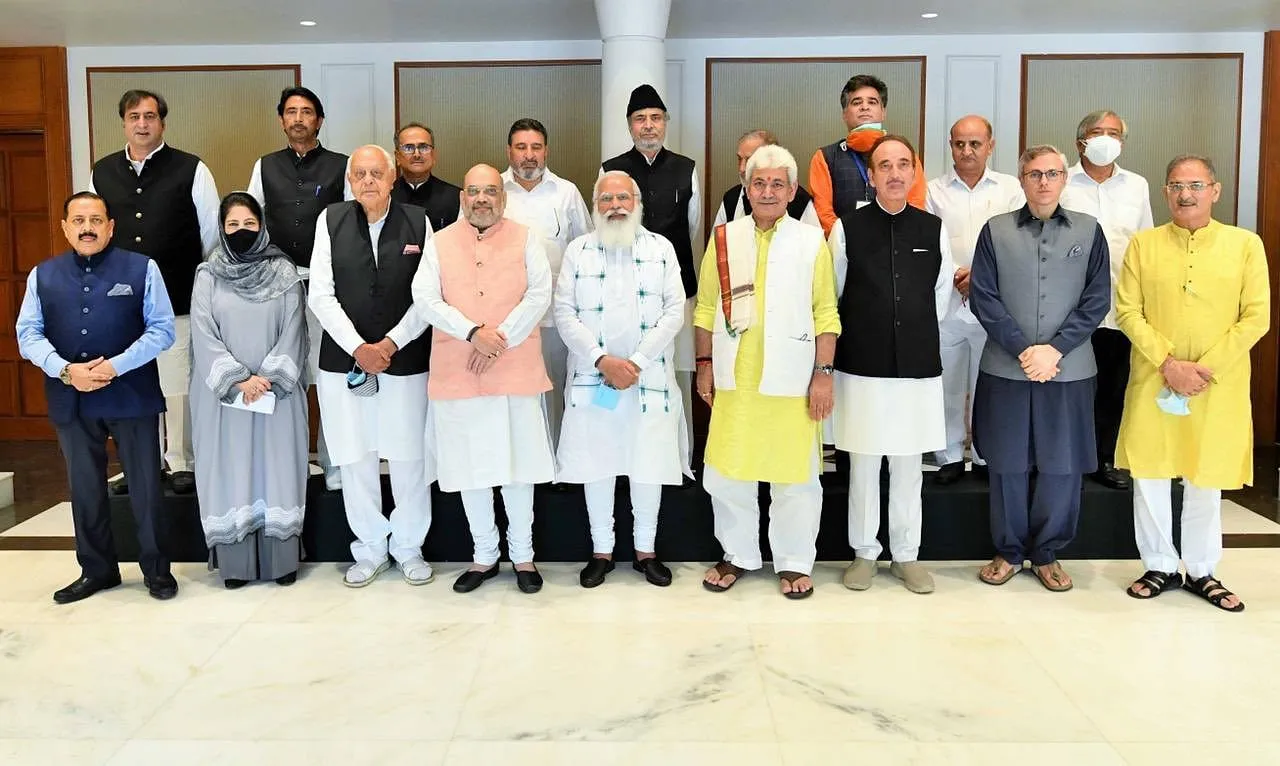After Prime Minister Narendra Modi’s big initiative of June 24, when he hosted Kashmir’s leaders to an all-party meet, I have been mulling to understand what has changed in practical terms except that there is a dramatic shift from confrontation of yesteryear to conciliation. But what have Kashmiri leaders achieved?
Delhi had promised statehood on August 5, 2019. It was the same day when it had scrapped Article 370, Article 35 A and announced split of the state into two union territories. Assembly elections after the Delimitation Commission process is complete is the national commitment that Prime Minister had held out on August 15, 2020.
A lot of debate has taken place as to what happened to the agenda that the Kashmiri leaders had announced before leaving for Delhi on the eve of talks. We are told that they did speak about it, and we also know, rather we already knew, what the response of the Centre would be. In fact, Centre was silent on that particular issue, that, in itself is a clear indication that Delhi, now or in future would not entertain any such ideas. It is a plain truth.
The Modi government has taken a step which it is very difficult for any government to reverse. The analogy of 70 years versus 70 weeks, 70 months and 70 years is a smart politics , but in the real terms, it reflects the harsh realities of the uncertainties of time as well. There is no crystal ball with anyone to predict when it would happen.
The measurement of time and political objectives are two different things. Politics draws its own calendar which is shaped by unseen events. It is not true that BJP was struggling to scrap Article 370 for the past 70 years, much of its task was accomplished by Congress that brought in more than 450 central laws to the erstwhile state of Jammu and Kashmir, did away with the titles and the core of the institutions. The dynamics of what all happened on August 5 suggest that there was national mood behind it, though it is also true that the true picture of Kashmir was never presented before the Indian nation, neither by the politician, nor by intellectuals. And worst kind of damage was done by the most Kashmir-illiterate TV anchors and few sections that had embarked on to teach a lesson.
All this needs to be assessed and analyzed. But at the same time, it would be proper for the Kashmiri leadership to explain that why the things went wrong, and how much were they the partners in damaging the image of Kashmir. You cannot shift stands all the time, make compromises and make rebellious noises and then expect the other side to oblige you all the time. There is a limited life of this kind of politics. It doesn’t concern Kashmir’s prism about Delhi, it is now an issue of what Kashmir thinks about Kashmir and its future. The trust deficiency has grown. Let Kashmiri leadership remove that trust deficiency within their land and between their people. Delhi is what Delhi is, but what Kashmiri leadership is to the people can be understood if their ears are to the ground.
There is a need for reorientation of Kashmir politics, it has to be Kashmir owned and Kashmir led in all its forms and manifestation, and in this there is only one condition that neither China nor Pakistan can help them. When the larger issues are on table then larger things should be left to real men and women who have the authority to talk and shape the things. There is a need for clarity which doesn’t come from changing statements with the changing times.
The application of mind is always important than playing the emotional politics. Today, Kashmiris are asking questions of their leaders, their capability to raise issues or for that matter understand what exactly is happening on the ground. They want them to act and not to hide behind the excuses, and there is a lot that they can do to mitigate sufferings of the people.
They raised some of these issues at the APM. But what follow up action they took in terms of mitigating the economic sufferings of the people of Jammu and Kashmir. They could have met other ministers to put across the woes of the people and presented a roadmap before them, how to redress their grievances. I am sure they were in a better position to do so. They are locals. That is their all-time asset. The argument that these issues were placed before the PM and Home Minister Amit Shah is valid, but did anyone stop them from airing the grievances of the people before the ministry of tourism, railways, commerce, and transport. I don’t think any union minister would have refused to listen to them, at least three of them are former chief ministers. The APM had restored them the dignity of the office that they had held after they were subjected to the humiliation for months in the aftermath of August 5, 2019.
If they could repeat the loss of Article 370, no one stopped them from repeating other issues before other ministries. There is an educational emergency in Jammu and Kashmir, fruit industry has its own problems, tourism people have not come out of their morass in which they landed in 2014 floods.
Politics gains importance only when it echoes the real-time issues. Now it is for the leadership to mull and think of new strategies to work for the well-being of the people – the politics of slogans and emotions would have a backlash of counter slogans and emotions. There already are many in other parts of the country waiting for Kashmir leadership to touch off controversies so that they can pounce on them and their narrative. That would take away what is available on table at the moment. A bird in the hand is worth two in the bush.







